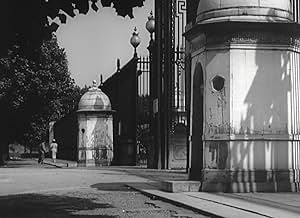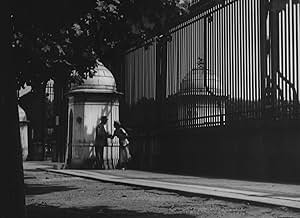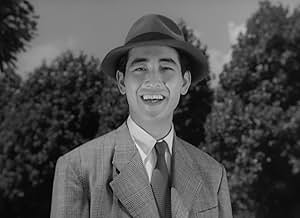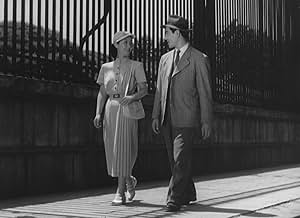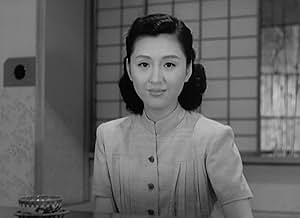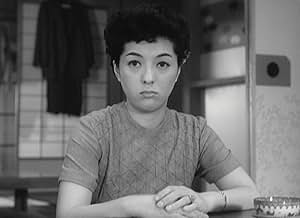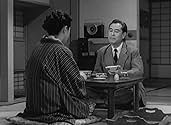VALUTAZIONE IMDb
7,6/10
4132
LA TUA VALUTAZIONE
Una coppia di mezza età senza figli deve affrontare una crisi coniugale.Una coppia di mezza età senza figli deve affrontare una crisi coniugale.Una coppia di mezza età senza figli deve affrontare una crisi coniugale.
- Premi
- 1 vittoria in totale
Recensioni in evidenza
Its about a rich family and arranged marriages. Taeko is in an arranged marriage which is not so successful, they communicate very badly and she lies to get out and do fun things with her friends. For her it is easy to lie to the husband as she thinks he is very stupid. Her niece don't want to go on a arranged marriage meet, but decide for herself who she wants to marry probably a sign of the times, the transition from traditional to modern Japan. In other ways also the modern is juxtaposed with the traditional, they wear kimonos as naturally as western style clothes. And her sister is working in a top position as a designer.
As another IMDb reviewer said this is most interesting because of the charming characters. The elegant, but a bit arrogant and selfish Satake Taeko (Kogure Michiyô) had me spellbound from beginning to end. All characters are interesting and the interaction and communication between them make up the movie.
The city itself takes up a small role in the movie as well, something I like a lot. Editing also is very clever at times. Its never ordinary or dull.
As another IMDb reviewer said this is most interesting because of the charming characters. The elegant, but a bit arrogant and selfish Satake Taeko (Kogure Michiyô) had me spellbound from beginning to end. All characters are interesting and the interaction and communication between them make up the movie.
The city itself takes up a small role in the movie as well, something I like a lot. Editing also is very clever at times. Its never ordinary or dull.
The Flavour of Green Tea over Rice (Ochazuke no aji) is an Ozu film; a subdued drama analyzing the transformation of Japan post-WWII in small, personal ways. This film follows a childless married couple as they navigate changing traditions, conceptions of marriage, and love. The relationship between the two is strained - the husband is a simple country man who enjoys his country cigarettes, riding in the third class passenger car of trains, and throwing himself into his work with tact and politeness. The wife is a city girl, enjoying spa days, expensive and luxurious decorations, and first class train rides. These two struggle to relate to each other, in a marriage that was set up over a decade ago as an arranged marriage.
The catalyst to this film is when their headstrong niece comes to stay. A product of the new Japan, she is not interested in an arranged marriage, and instead wants to meet someone through dating, and marry for love, not familial status. This is scandalous to both her parents and our married couple. However, the two begin to see each other in a new light, engaging with new ideas, trying new things, and ultimately coming together in a touching and mute scene of culinary exploration and intimacy.
Ozu has a way with scenes. Each scene is meticulously detailed, and dripping with meaning, while maintaining a muted, quite feel. Ozu is, of course, a master of film making of this era, and this film is no different. It poignantly portrays the changing nature of relationships, love and marriage in Japan with subtlety, grace, and beauty. There are many wonderful scenes and shots in this film, and it is an Ozu film worth watching.
Complaints-wise, this film feels much slower then many of Ozu's films, almost to the point of not really moving. This seems to be a stylistic choice that compliments the thesis of the film, but also makes the film a bit distractable at times. Scenes feel like they jump at times, and the chronology of events, while supposed to be clear, is often not, for brief moments.
A wonderful film in many ways that just, barely, lacks the Ozu charm and perfection that is common in films like Tokyo Story, for example. Even so, this is a lovely, sweet and touching film that is easily watchable, and contains many of the charms of Ozu's work. Easy recommendation for fans of Ozu, or fans of quite, small and beautiful stories and dramas.
The catalyst to this film is when their headstrong niece comes to stay. A product of the new Japan, she is not interested in an arranged marriage, and instead wants to meet someone through dating, and marry for love, not familial status. This is scandalous to both her parents and our married couple. However, the two begin to see each other in a new light, engaging with new ideas, trying new things, and ultimately coming together in a touching and mute scene of culinary exploration and intimacy.
Ozu has a way with scenes. Each scene is meticulously detailed, and dripping with meaning, while maintaining a muted, quite feel. Ozu is, of course, a master of film making of this era, and this film is no different. It poignantly portrays the changing nature of relationships, love and marriage in Japan with subtlety, grace, and beauty. There are many wonderful scenes and shots in this film, and it is an Ozu film worth watching.
Complaints-wise, this film feels much slower then many of Ozu's films, almost to the point of not really moving. This seems to be a stylistic choice that compliments the thesis of the film, but also makes the film a bit distractable at times. Scenes feel like they jump at times, and the chronology of events, while supposed to be clear, is often not, for brief moments.
A wonderful film in many ways that just, barely, lacks the Ozu charm and perfection that is common in films like Tokyo Story, for example. Even so, this is a lovely, sweet and touching film that is easily watchable, and contains many of the charms of Ozu's work. Easy recommendation for fans of Ozu, or fans of quite, small and beautiful stories and dramas.
Ozu marriage stories are one of the best ones. He really hits you with his deep and truthful dialogues. I loved the cinematography and the use of shadows. Also, I got hungry watching this.
Japanese master Yasujiro Ozu made this 1952 film between two masterpieces, Early Summer and (especially) Tokyo Story, and this film suffers a bit by comparison with them. As in other (somewhat more accomplished) movies by Ozu (one thinks especially of the superb Late Spring) the plot deals on the issue of whether a young woman should marry, and if that marriage should be a love marriage or arranged one. There is a middle aged, childless couple, the snobbish, nasty Taeko (Michiyo Kogure) and her husband, the honest, good but a bit dull salary man Satake (Shin Saburi). Her nephew, the pretty young Setsuko (Keiko Tsushima) comes to visit, she has to go to an interview for an arranged marriage, but seeing the loveless marriage between Taeko and Satake, and how she mocks him behind his back, is not very interested.
Ozu's best films haven't dated a bit, but this one has somewhat. Moreover, while I don't agree with the generalization that all of Ozu's films are slow (not all of them are), this one is on the leisurely paced side. What's more, the movie takes some time to develop its plot so it does require a bit of patience from the viewer. You will eventually warm up to this movie, I think, but not immediately.
On the plus side, it is a good, interesting movie, with believable, well developed characters. Chishu Ryu, Chikage Awashima and Kumiko Mikaye (all regular of many Ozu films) have bit roles here.
Ozu's best films haven't dated a bit, but this one has somewhat. Moreover, while I don't agree with the generalization that all of Ozu's films are slow (not all of them are), this one is on the leisurely paced side. What's more, the movie takes some time to develop its plot so it does require a bit of patience from the viewer. You will eventually warm up to this movie, I think, but not immediately.
On the plus side, it is a good, interesting movie, with believable, well developed characters. Chishu Ryu, Chikage Awashima and Kumiko Mikaye (all regular of many Ozu films) have bit roles here.
This is both typical and untypical Ozu - typical in that its a simple story with a typical simple point (but of course told with deceptive skill and complexity), but its unusual in that its set among the upper middle classes, not the 'average' Japanese family of most of his movies.
The story is straightforward - an unhappy marriage between a rich girl and her successful but relatively low born husband. She can't hide her contempt for his dullness and rustic ways. He is unhappy but never argues back, just finds his own little ways of getting pleasure out of life. A series of incidents finds them having an unexpected late night simple meal (green tea over rice is essentially 'leftovers' when nothing else is available) and suddenly she realizes she loves him after all.
As always with Ozu, the richness is in the characters. Taeko, played by Michiyo Kogure is spoiled and insensitive, but a compelling, capricious character. Mokicho (the husband) under his dull salary-man skin is really a sensitive, caring man. The other characters are all vivid and memorable, especially Setsuko, the headstrong niece. There are also wonderful set pieces, usually involving Taekos friends, having little girls nights together, gossiping about their husbands and plotting marriages.
With Ozu a brief overview of his movies always makes him sound dull. But in reality this is funny, moving and compelling. Its not first rate Ozu - the theme of the movie is too straightforward and obvious, the ending a little too neat and tidy. But second rate Ozu is still head and shoulders above almost any other drama. The humanity of the characters shines through, creating a little world we can sink into. The wonder of Ozu is that we are not observing characters, we are sitting with them, in the middle of their lives.
I can't help but compare this to Naruse's 'Repast', another movie about a marriage in trouble, where the wife cannot hide her contempt for her husband, but in the end they both realize why they love each other. Naruse was more of a pessimist, so the reconciliation at the end of Repast is both happy and sad, as the characters realize that that living together, even without a great love, is better than being lonely. In Ozu's more traditional world, the couple (product of an arranged marriage) eventually find love, even after many years of marriage by the acceptance of each others little foibles. Taeko learns that simple things can be as pleasurable as luxury. It seems a little trite, and it would be in another film makers hands, but somehow Ozu finds depths of wisdom even in such clichés.
The irony is that Ozu was a lifelong bachelor, yet he made perhaps the best movies ever made at examining families in detail. If I had my way I'd put this movie and 'Repast' as compulsive viewing for all engaged couples. It would be more effective than any pre-marriage course!
The story is straightforward - an unhappy marriage between a rich girl and her successful but relatively low born husband. She can't hide her contempt for his dullness and rustic ways. He is unhappy but never argues back, just finds his own little ways of getting pleasure out of life. A series of incidents finds them having an unexpected late night simple meal (green tea over rice is essentially 'leftovers' when nothing else is available) and suddenly she realizes she loves him after all.
As always with Ozu, the richness is in the characters. Taeko, played by Michiyo Kogure is spoiled and insensitive, but a compelling, capricious character. Mokicho (the husband) under his dull salary-man skin is really a sensitive, caring man. The other characters are all vivid and memorable, especially Setsuko, the headstrong niece. There are also wonderful set pieces, usually involving Taekos friends, having little girls nights together, gossiping about their husbands and plotting marriages.
With Ozu a brief overview of his movies always makes him sound dull. But in reality this is funny, moving and compelling. Its not first rate Ozu - the theme of the movie is too straightforward and obvious, the ending a little too neat and tidy. But second rate Ozu is still head and shoulders above almost any other drama. The humanity of the characters shines through, creating a little world we can sink into. The wonder of Ozu is that we are not observing characters, we are sitting with them, in the middle of their lives.
I can't help but compare this to Naruse's 'Repast', another movie about a marriage in trouble, where the wife cannot hide her contempt for her husband, but in the end they both realize why they love each other. Naruse was more of a pessimist, so the reconciliation at the end of Repast is both happy and sad, as the characters realize that that living together, even without a great love, is better than being lonely. In Ozu's more traditional world, the couple (product of an arranged marriage) eventually find love, even after many years of marriage by the acceptance of each others little foibles. Taeko learns that simple things can be as pleasurable as luxury. It seems a little trite, and it would be in another film makers hands, but somehow Ozu finds depths of wisdom even in such clichés.
The irony is that Ozu was a lifelong bachelor, yet he made perhaps the best movies ever made at examining families in detail. If I had my way I'd put this movie and 'Repast' as compulsive viewing for all engaged couples. It would be more effective than any pre-marriage course!
Lo sapevi?
- QuizAt the start of the film, two characters mention going to see a new film with Jean Marais. The film was most likely Orfeo (1950), which was released in Japan in June 1951.
- Citazioni
Taeko Satake: Think well before you pick your groom, it's important.
- ConnessioniFeatured in David Bordwell on 'The Flavor of Green Tea Over Rice' (2019)
- Colonne sonoreLove's Old Sweet Song
Composed by J.L. Molloy (as James Lyman Molloy)
I più visti
Accedi per valutare e creare un elenco di titoli salvati per ottenere consigli personalizzati
- How long is The Flavor of Green Tea Over Rice?Powered by Alexa
Dettagli
- Data di uscita
- Paese di origine
- Lingua
- Celebre anche come
- The Flavor of Green Tea Over Rice
- Luoghi delle riprese
- Azienda produttrice
- Vedi altri crediti dell’azienda su IMDbPro
- Tempo di esecuzione
- 1h 56min(116 min)
- Colore
- Mix di suoni
- Proporzioni
- 1.37 : 1
Contribuisci a questa pagina
Suggerisci una modifica o aggiungi i contenuti mancanti

